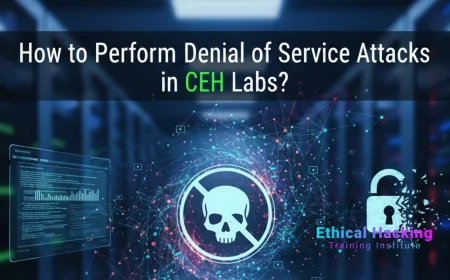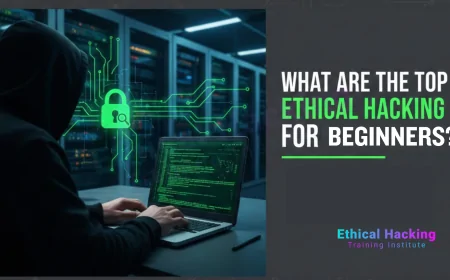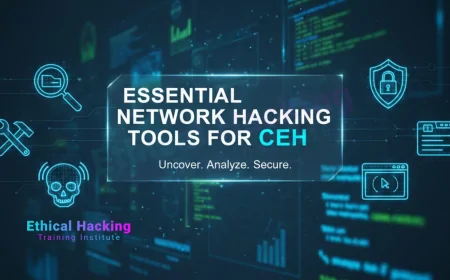Skills You Will Learn in an Ethical Hacking Course | Complete Breakdown
Discover the key skills learned in an ethical hacking course, including penetration testing, malware analysis, web application security, and more. Start your ethical hacking career today!

Introduction
Ethical hacking has become one of the most crucial fields in cybersecurity. With the growing frequency and sophistication of cyberattacks, organizations are increasingly relying on ethical hackers to secure their systems and networks. An ethical hacker, often referred to as a "white-hat hacker," is tasked with identifying vulnerabilities in a system before malicious hackers can exploit them. If you're considering a career in cybersecurity, an ethical hacking course is a great way to equip yourself with the skills needed to excel in this high-demand field.
In this blog, we will break down the key skills you will learn in an ethical hacking course, from fundamental concepts to advanced techniques, giving you a comprehensive understanding of what to expect.
1. Understanding the Basics of Ethical Hacking
Before diving into complex hacking techniques, you'll first learn the foundational concepts of ethical hacking. This includes the legal and ethical aspects of hacking, the different types of hackers, and the various tools used in ethical hacking. You'll also explore the difference between ethical hacking and malicious hacking, as well as the roles and responsibilities of an ethical hacker.
Key Topics:
-
What is ethical hacking?
-
Understanding the cybersecurity landscape
-
Legal and ethical considerations in hacking
-
Types of hackers (white-hat, black-hat, gray-hat)
-
The ethical hacker’s responsibilities
2. Network Fundamentals
A strong understanding of networking is essential for ethical hacking, as most cyberattacks target network systems. You'll learn about the fundamental concepts of networking, including how devices communicate over a network and the types of protocols used for communication. This knowledge is critical for identifying vulnerabilities in network infrastructure and securing communication channels.
Key Topics:
-
OSI Model and TCP/IP Stack
-
Subnetting and IP addressing
-
Understanding routers, switches, and firewalls
-
Network protocols (HTTP, HTTPS, FTP, DNS, etc.)
-
VPNs, proxies, and tunneling
3. Reconnaissance and Information Gathering
One of the first steps in ethical hacking is information gathering, which involves identifying potential targets and understanding their systems. You'll learn how to gather information about your target without interacting with their systems directly. This is known as "passive reconnaissance."
Key Topics:
-
Open Source Intelligence (OSINT)
-
Footprinting and fingerprinting techniques
-
WHOIS, DNS, and IP lookup
-
Social engineering techniques for information gathering
-
Tools for reconnaissance: Nmap, Whois, Maltego, etc.
4. Scanning and Enumeration
Once you’ve gathered basic information about the target, you’ll move on to scanning their systems for vulnerabilities. This phase involves identifying open ports, services, and other potential entry points into the system. The goal is to map out the target’s infrastructure and discover any weaknesses that may exist.
Key Topics:
-
Network scanning techniques
-
Vulnerability scanning and assessment
-
Port scanning (Nmap, Netcat)
-
Service enumeration (SMB, SNMP, HTTP)
-
Banner grabbing
5. System Hacking and Exploitation
After identifying vulnerabilities, the next step in the ethical hacking process is system exploitation. In this module, you will learn how to exploit vulnerabilities to gain unauthorized access to systems. Ethical hackers do this to assess the impact of an attack and help fix the flaws before malicious hackers can exploit them.
Key Topics:
-
Gaining access through system vulnerabilities
-
Buffer overflow attacks
-
Privilege escalation techniques
-
Password cracking and brute force attacks
-
Metasploit framework and its use in exploitation
6. Malware Analysis and Reverse Engineering
In this section of the course, you'll learn how to analyze malware to understand how it operates and how it can be used to infiltrate systems. Reverse engineering involves deconstructing malware to analyze its behavior, identify vulnerabilities, and detect the methods used to infect systems.
Key Topics:
-
Introduction to malware analysis
-
Static and dynamic analysis techniques
-
Reverse engineering tools (IDA Pro, OllyDbg, Wireshark)
-
Analyzing different types of malware (viruses, worms, trojans)
-
Sandboxing and malware emulation
7. Web Application Hacking
Web applications are often prime targets for cyberattacks. In this section, you’ll learn how to identify and exploit vulnerabilities in web applications. You'll study common web vulnerabilities and understand how attackers can exploit them to gain unauthorized access or manipulate data.
Key Topics:
-
OWASP Top 10 web vulnerabilities
-
SQL injection attacks
-
Cross-Site Scripting (XSS) and Cross-Site Request Forgery (CSRF)
-
Session hijacking and cookie stealing
-
Web application penetration testing tools (Burp Suite, OWASP ZAP)
8. Wireless Network Hacking
Wireless networks are particularly vulnerable to attacks because they often have weaker security mechanisms. In this section, you’ll learn how to break into wireless networks, including those using Wi-Fi Protected Access (WPA) encryption. Understanding wireless security is critical for ethical hackers to protect sensitive data transmitted over wireless connections.
Key Topics:
-
Wireless network protocols (WEP, WPA, WPA2)
-
Wi-Fi cracking tools (Aircrack-ng, Wireshark)
-
Rogue access points and evil twin attacks
-
Denial-of-Service (DoS) attacks on wireless networks
-
Securing wireless networks
9. Cryptography and Encryption
Cryptography is an essential component of cybersecurity, as it ensures data confidentiality, integrity, and authenticity. In this section, you'll learn the fundamental principles of cryptography, how encryption algorithms work, and how to bypass cryptographic protections when necessary.
Key Topics:
-
Symmetric and asymmetric encryption
-
Hashing algorithms (MD5, SHA-1, SHA-256)
-
Digital signatures and certificates
-
Public Key Infrastructure (PKI)
-
Cryptanalysis techniques
10. Penetration Testing Methodology
Penetration testing is the process of evaluating the security of a system or network by simulating an attack. In this section, you will learn the penetration testing methodology, which includes steps such as information gathering, vulnerability assessment, exploitation, and reporting.
Key Topics:
-
Penetration testing lifecycle
-
Planning and scoping a penetration test
-
Exploiting vulnerabilities
-
Post-exploitation techniques
-
Creating penetration testing reports
11. Reporting and Documentation
Once a system has been successfully tested and vulnerabilities have been exploited, it’s essential to document your findings. This helps organizations understand the risks and take action to mitigate them. Ethical hackers learn how to present their findings clearly and professionally.
Key Topics:
-
Writing clear, actionable reports
-
Documenting vulnerabilities and risk assessments
-
Best practices for reporting to management
-
Creating remediation plans
-
Explaining complex technical concepts to non-technical audiences
Conclusion
By the end of an ethical hacking course, you'll have a solid foundation in cybersecurity, with hands-on experience in penetration testing, malware analysis, vulnerability scanning, and much more. These skills will equip you to become an expert in the field of ethical hacking and prepare you for a career in cybersecurity. As cyber threats continue to evolve, the demand for ethical hackers will only increase, making it an exciting and rewarding career path.
FAQs
What is ethical hacking?
Ethical hacking involves identifying and fixing vulnerabilities in systems to prevent cyberattacks. Ethical hackers use the same tools and techniques as malicious hackers but do so legally and with permission.
What are the key skills learned in an ethical hacking course?
You will learn skills such as penetration testing, network security, web application security, malware analysis, cryptography, and vulnerability assessment.
Is prior technical knowledge required for an ethical hacking course?
Basic knowledge of networking and operating systems is helpful, but many ethical hacking courses start from the fundamentals, making them accessible to beginners.
How long does it take to complete an ethical hacking course?
Most ethical hacking courses last between 3 to 6 months, depending on the intensity and depth of the course.
What is penetration testing in ethical hacking?
Penetration testing is the practice of testing a system’s security by simulating attacks to identify vulnerabilities and weaknesses.
How do ethical hackers identify vulnerabilities?
Ethical hackers use a variety of tools and techniques, including network scanning, vulnerability scanning, and exploiting system weaknesses in a controlled environment.
What tools do ethical hackers use?
Some popular tools include Metasploit, Burp Suite, Wireshark, Nmap, Kali Linux, and Aircrack-ng.
Is ethical hacking legal?
Yes, ethical hacking is legal when performed with permission and for the purpose of identifying and fixing vulnerabilities.
What is web application hacking?
Web application hacking involves exploiting vulnerabilities in web applications, such as SQL injection, XSS, and session hijacking, to gain unauthorized access.
What is malware analysis?
Malware analysis involves studying malicious software to understand how it works, how it spreads, and how it can be neutralized.
What is cryptography in ethical hacking?
Cryptography is the practice of securing communications and data through encryption. Ethical hackers learn how to break cryptographic protections to identify weaknesses.
Can ethical hackers work as freelancers?
Yes, ethical hackers can work as freelancers, providing security audits, penetration testing, and other cybersecurity services to businesses.
Are ethical hacking certifications necessary?
Certifications such as CEH (Certified Ethical Hacker) are often required or preferred by employers in the cybersecurity field.
How do ethical hackers protect networks?
Ethical hackers implement security measures such as firewalls, intrusion detection systems, and secure coding practices to protect networks from attacks.
What is a buffer overflow attack?
A buffer overflow attack occurs when more data is written to a buffer than it can hold, potentially allowing attackers to execute arbitrary code.
What is social engineering in ethical hacking?
Social engineering involves manipulating individuals into divulging confidential information or performing actions that compromise security.
Can I learn ethical hacking online?
Yes, many online platforms offer ethical
What is ethical hacking and why is it important?
Ethical hacking is the authorized practice of probing systems for security weaknesses to prevent malicious attacks and improve cybersecurity.
Who can enroll in an ethical hacking course?
Anyone interested in cybersecurity—especially IT students, graduates, or professionals—can enroll in an ethical hacking course.
Do I need a computer science background to learn ethical hacking?
While it's helpful, a strong interest in technology and a willingness to learn is enough to get started with ethical hacking.
What are the basic skills I will learn in an ethical hacking course?
You’ll learn networking, operating systems, vulnerability scanning, system hacking, web security, malware analysis, and reporting.
Will I learn about real-world hacking tools in the course?
Yes, courses typically include hands-on training using real-world tools like Nmap, Wireshark, Metasploit, Burp Suite, and Kali Linux.
Is programming required for ethical hacking?
Basic programming knowledge helps, especially in languages like Python, Bash, and JavaScript, but it's not always mandatory at entry level.
How is ethical hacking different from penetration testing?
Ethical hacking is broader, including penetration testing as one component, along with scanning, reconnaissance, and reporting.
What operating systems are used during ethical hacking training?
Most training uses Linux (especially Kali Linux), Windows, and virtual machines for hands-on practical labs.
Will I learn about wireless network hacking in the course?
Yes, you will explore techniques to test and secure Wi-Fi networks, including WPA/WPA2 cracking and rogue access point detection.
Is there any legal risk involved in learning hacking?
No, ethical hacking is legal as long as you work within authorized environments and follow cybersecurity laws.
What are OWASP Top 10 vulnerabilities?
These are the top 10 most critical web application security risks identified by the Open Web Application Security Project, taught in most courses.
Will I be able to perform a full penetration test after the course?
Yes, ethical hacking courses teach a complete penetration testing methodology from planning to exploitation and reporting.
Do courses cover social engineering attacks?
Yes, many courses cover human-based attacks like phishing, baiting, and impersonation as part of the reconnaissance process.
How are ethical hacking skills tested during the course?
You’ll undergo hands-on labs, simulated attacks, real-time scenarios, quizzes, and sometimes a capstone project or final exam.
Can I prepare for CEH (Certified Ethical Hacker) through this course?
Yes, most ethical hacking courses are aligned with the CEH certification syllabus and help in its preparation.
Will I learn about system hacking and privilege escalation?
Absolutely. You'll explore techniques to gain unauthorized access and elevate privileges in test environments ethically.
Do ethical hacking courses teach how to detect and analyze malware?
Yes, malware analysis and reverse engineering are commonly included to understand and counter malicious software.
What kind of jobs can I get after learning ethical hacking?
You can apply for roles like Security Analyst, Penetration Tester, SOC Analyst, Vulnerability Assessor, and Cybersecurity Consultant.
How does an ethical hacker help organizations?
They simulate cyberattacks to uncover vulnerabilities and help businesses patch their systems before real attackers exploit them.
Are ethical hacking courses available online in Pune?
Yes, many Pune-based institutes offer both online and classroom-based ethical hacking courses with flexible timings.
Will I receive a certificate after completing the course?
Most institutes offer course completion certificates and prepare students for industry-recognized certifications like CEH or CompTIA Security+.
Do ethical hacking courses include project-based learning?
Yes, students often work on real-time projects such as vulnerability reports, web app testing, and simulated attacks.
Can ethical hacking be learned while studying in college?
Yes, many students pursue ethical hacking as a parallel skill to their college education, especially in engineering or IT streams.
Is ethical hacking only about attacking systems?
No, it also focuses on securing systems, writing reports, recommending fixes, and understanding defense mechanisms.
How much time should I dedicate to practice ethical hacking?
Daily 1–2 hours of hands-on practice is ideal to build strong ethical hacking skills over time.
What is the difference between white-hat and black-hat hackers?
White-hat hackers are ethical professionals who protect systems, while black-hat hackers attack systems illegally for personal gain.
Can I start a freelance career after completing the course?
Yes, many certified ethical hackers work as freelancers offering services like security audits and bug bounty hunting.
Will I learn about mobile application hacking?
Some advanced ethical hacking courses cover mobile app security and testing Android/iOS application vulnerabilities.
Do ethical hacking courses include cloud security training?
Many updated courses now include basic cloud security modules to address vulnerabilities in cloud platforms.
Why is documentation important in ethical hacking?
Proper documentation and reporting help organizations understand security risks and implement proper fixes after tests.
What's Your Reaction?
 Like
0
Like
0
 Dislike
0
Dislike
0
 Love
0
Love
0
 Funny
0
Funny
0
 Angry
0
Angry
0
 Sad
0
Sad
0
 Wow
0
Wow
0

















